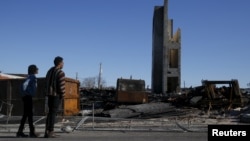Baltimore is about to embark on a $700 million effort to tear down empty and crumbling buildings in some of the city's poorest neighborhoods and replace them with affordable housing, stores and parks.
The first area to be transformed is Sandtown-Winchester — the primarily African-American neighborhood where Freddie Gray grew up. His death from having his spinal cord severed in the back of a police van led to last year's riots in Baltimore and complaints that the city neglects certain parts of town.
"Fixing what's broken in Baltimore requires that we address the sea of abandoned, dilapidated buildings infecting entire neighborhoods," Maryland Governor Larry Hogan said Tuesday. "Together, we will transform these neighborhoods from centers for crime and drugs to places our city and our entire state can be proud of."
Baltimore is a major international port with a 300-year history of industry, culture and world-renowned colleges. In recent years, however, Baltimore has gained a national reputation as a violent city where its black majority, especially young men, find few job and educational opportunities.
The city's 2015 murder total hit 344 — its highest ever. Some parts of town have no green space, supermarkets or schools, but do have blocks and blocks of boarded-up houses, abandoned gas stations, trash-filled alleys and liquor stores.
Baltimore's past urban renewal projects in the 1960s and '70s were hugely successful. They brought in hundreds of millions of dollars in tourist revenue and revived a moribund downtown nightlife.
City officials are hoping once again to turn dreary blight into something bright.




